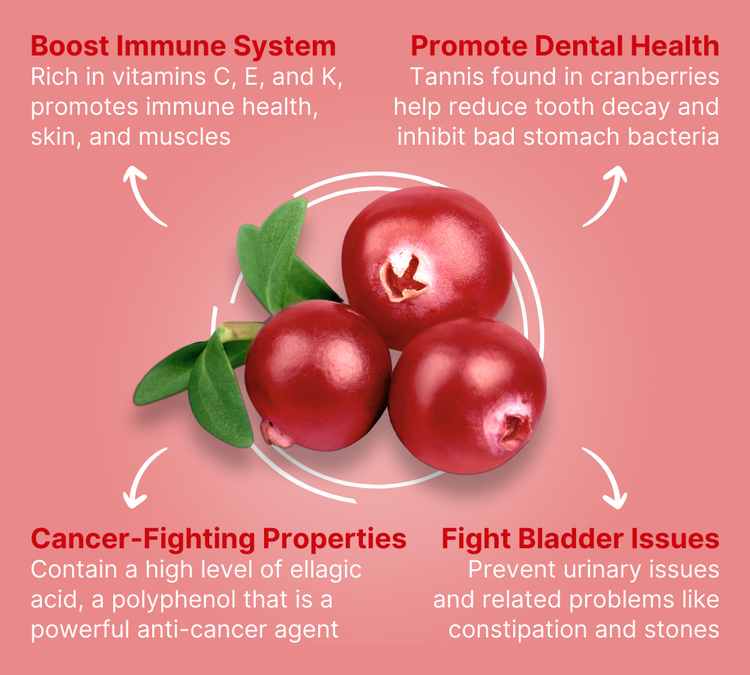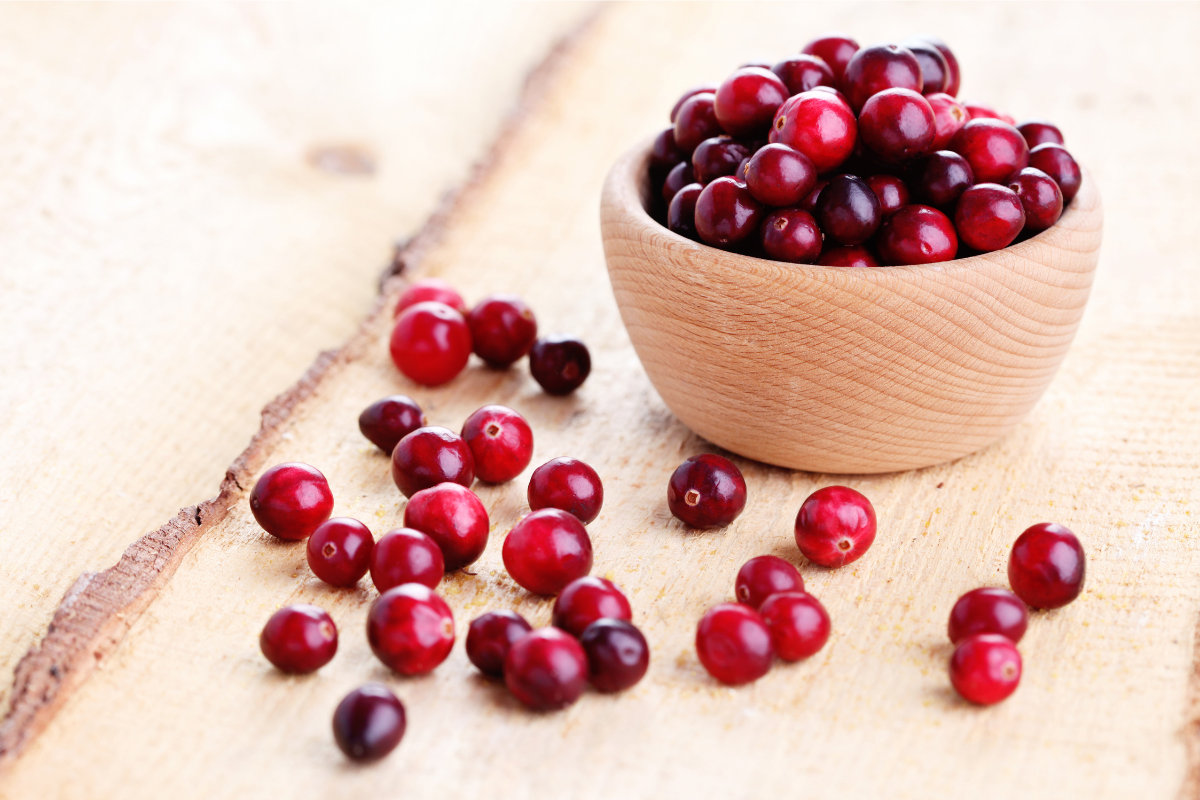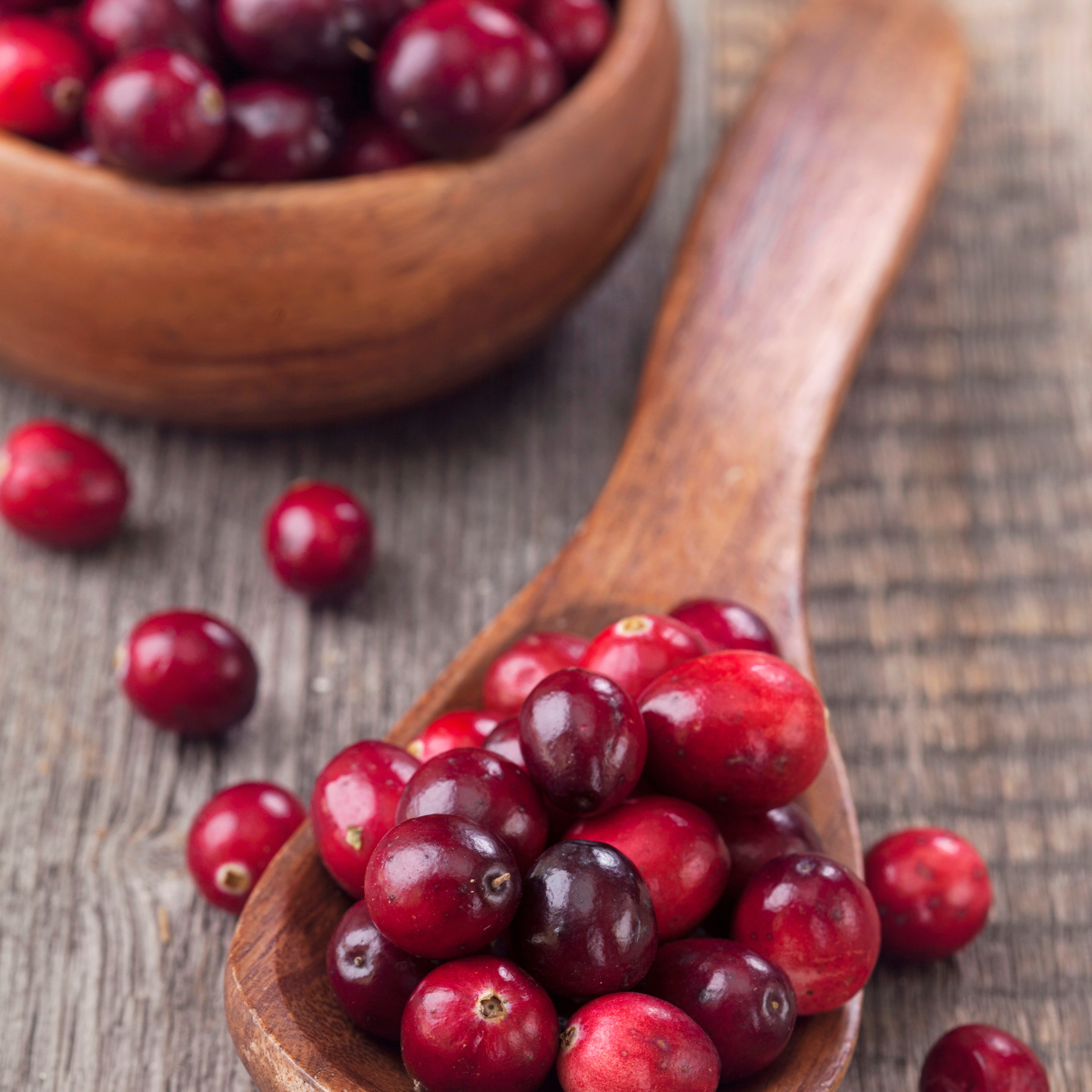The Benefits of Cranberry
Published on April 19, 2024


Cranberries are for life, not just for Christmas - the health benefits of this festive ingredient
What’s the first thing you think of when you hear the word ‘cranberry’? Yuletide turkey and cranberry sauce, perhaps? Dried cranberries in your favourite trail mix? Or a superhero ingredient, ready to fight a urinary tract infection at a moment’s notice? Cranberries may be small, but they are su-paw mighty. Read on for more about why this ingredient is more than just a festive fruit for Thanksgiving or Christmas - and why including it in your dog or cat’s diet is a fantastic idea.
Can dogs eat cranberries?
The cranberry comes from the cranberry bush (or Vaccinium marocarpon), and has been used in medicinal treatments for thousands of years. Packed with antioxidants and nutrients, cranberries offer a multitude of health benefits, helping to fight bacteria, prevent cancer and improve bladder health. Full of vitamins C, E and K, as well as iron, calcium and magnesium, cranberries can give your pets an energizing boost to the immune system and help keep them healthy from head to tail!
Vitamin C - helps to support immune health, strong skin, bone and muscle.
Vitamin E - antioxidant known to support immune health in pets.
Vitamin K1 - essential for blood clotting.
Tell me more!
Gladly! The list of the benefits of cranberries for dogs and cats goes on:
- Cranberries contain a high level of ellagic acid, a polyphenol known to be a powerful anti–cancer agent.
- Cranberries can help with urinary tract infections (a common affliction of dogs and cats) by inhibiting microorganisms from adhering to the bladder and urinary tract. Not just that - they are also effective for combating constipation, bladder stones, kidney stones and other urinary tract issues. Perhaps most beneficially, they also help to acidify urine for those pets prone to struvite crystals!
- The tannins found in cranberries help reduce tooth decay and inhibit bad stomach bacteria from adhering to the stomach. By fighting the bad bacteria in the stomach, they help promote a healthy gut in your pet.
- Cranberries have anti-inflammatory properties that help reduce inflammation caused by common ailments like arthritis.
- Cranberries also contain quercetin (nature's Benadryl!), which can help alleviate symptoms associated with allergies.
Let’s talk about Smack…
While cranberries can be consumed fresh (ground) or dried (powder), make sure not to feed your pets cranberries which have been processed with added sugars or artificial sweeteners such as xylitol - these additives can cause stomach upsets and be toxic for dogs. So instead of sharing the cranberry sauce with your pup, reach for a bag of Smack instead - we only use whole, organic cranberries in our recipes!
Here at Smack Pet Food, we LOVE cranberries. Our Canadian-grown GMO-free cranberries can be found in Prairie Harvest Pork, Very Berry Chicken for Dogs, Purrfect Pork for Cats and Very Berry for Cats.
Cranberries for the win
In conclusion, cranberries are safe for dogs, and add a burst of nutrition to your pet’s bowl. Of course, your pup or kitty might not even like the taste of cranberries (to each their own, right?) but if they do, it’s a great snack or meal component that can have a ton of paw-sitive benefits. So as we head into the season of giving thanks and holiday celebrations, why not let your pet enjoy this festive ingredient too!
As with any food, too much cranberry can cause issues for your pet. Start with small quantities, and always consult your veterinarian with any concerns or questions. If you’re feeding them dried, ensure that they aren’t mixed in with any raisins - grapes and their dried counterparts can be toxic for dogs, so please be sure to avoid them!




More Blogs to Read...
January 27,2024
Winter Pet Care Guide
As the winter chill sets in, it's crucial to ensure our furry friends stay warm and comfortable. Our latest blog dives into essential winter pet care tips, offering valuable advice on how to protect your dog from the cold. From cozy bedding to nutritional needs, discover how to keep your beloved pet happy and healthy throughout the colder months. Click below to read more about safeguarding your pet's well-being this winter.
January 18, 2023
Local Business Spotlight -
Love's Pets
Discover the heartwarming story behind a cherished local business that's making a significant impact on pet health and happiness. In our latest blog, we shine the spotlight on Love's Pets, a haven for pet owners seeking quality nutrition and care for their furry friends. Dive into the journey, philosophy, and community spirit that make Love's Pets a beloved part of our neighborhood. Read more about how they're changing the game for pet wellness here.
December 7, 2023
Elevating the Health of
Your Senior Dog
Did you know that Smack Pet Food is a versatile choice that can cater to every stage of your furry friend's life? Our raw dehydrated superfood product offers the ideal blend of raw, fresh nutrition in a convenient, no-fuss format—no fridge or freezer required! In this blog, we're excited to shed light on how transitioning your senior dog to a Smack-exclusive diet can make a remarkable difference in their well-being and quality of life.
November 14,2023
The Benefits of (Curly) Parsley
Parsley - probably not the first ingredient we think of when it comes to superfoods, but this herb has more to offer than just a pop of green on your plate. Parsley - the curly variety - actually offers a range of AMAZING nutritional benefits to our pets (and us!). A powerhouse of vitamins as well as anti-inflammatory and antioxidant properties, we’re all about including it in our pets’ bowls. Read on for more about why parsley really is a paw-some herb
October 30, 2023
Animal Pain Awareness
One often-overlooked aspect crucial for the well-being of our pets is recognizing the signs of pain they exhibit. Equally significant is our knowledge of how to maintain their overall health through a proper diet, which aids in preserving robust joint health and alleviating discomfort for our beloved companions. In this blog, we delve into the topic of animal pain awareness and offer expert insights from Belinda Morrison, the founder of CB Rescue, a non-profit dog rescue organization in Calgary, Alberta.
October 4, 2023
The Benefits of Pumpkin
’Tis the pumpkin season! Pumpkin pie, pumpkin spice lattes, pumpkin bread - it’s hard to avoid this Thanksgiving favourite. But did you ever wonder if your pet was missing out by not getting to join in on this taste of fall? Perhaps surprisingly, pumpkin is an amazing ingredient to include in your dog or cat’s diet, and offers a huge range of benefits to their short and long-term health. Read on for more about what makes pumpkin so perfect!
September 15, 2023
Smack...vs Fresh Food
We take pride in crafting top-quality pet nutrition. Our raw, dehydrated offerings deliver the goodness of fresh and raw ingredients in an easy-to-serve format, no refrigeration needed. Wondering how we stack up against traditional fresh pet food? Let's explore the benefits of choosing Smack for your furry friend.
September 11, 2023
Local Business Spotlight
Red Barn Market
Discover the story of Red Barn Market, a local farmers' market turned pet food haven under the management of Tracy Dow. Explore their commitment to Canadian-made pet products, nutrient-dense options like Smack Pet Foods, and the mission to offer value and quality to loyal customers in the Greater Victoria area.
September 7, 2023
Elevating the Health of
Your Senior Dog
We understand that leaving your beloved pet alone at home can be a daunting task. Whether you are returning to the office after years of remote work or the kids are heading back to school after a summer of play, your pet will likely need some support as they adapt to solitude. Discover how to smooth this transition and understand the emotional cues your pet may convey during your absence.


 CA
CA

